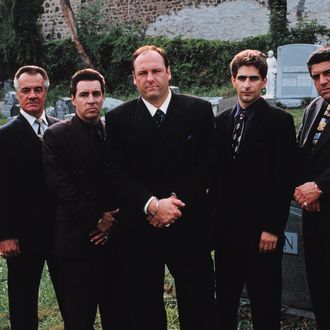
When The Sopranos started fourteen years ago, it was immediately hailed as a masterpiece. But it wasn’t clear at the time that the show would have a massive impact on television for years to come or how long a shadow the character Tony Soprano would cast. James Gandolfini’s passing yesterday has, not surprisingly, elicited a mountain of tributes to him, to his iconic character, to his legacy as a decent dude in a weird profession. And many of these stories talk about how much “we all loved” Tony Soprano.
I don’t feel like that at all. I never loved Tony Soprano and I honestly still don’t quite understand how other people could. Entertained by Tony Soprano? That I can see. Invested in Tony Soprano? Sure — Gandolfini and Sopranos creator David Chase made it disturbingly easy to see the world through Tony’s eyes. For me, though, the draw of Gandolfini’s performance wasn’t that he made me love Tony. It’s that he made me feel sorry for him, for this rich, powerful, selfish asshole who killed people with impunity. Gandolfini’s feat in reinventing the tough guy was that he added a perpetual misery to the swagger of a gangster and the ordinariness of a suburban dad.
I was in high school when The Sopranos started, and even at that age, my strongest response to Tony was Wow, that guy is sad. More than macho, or dangerous, or vulnerable, or unloved, Tony Soprano was sad. Depressed, too. But also deeply, totally sad. We’d see these moments of Tony in repose — eating by himself in the dark, driving alone, laying in bed at the end of the day — and suddenly yet subtly, this aura of total dejection would radiate from him. Dr. Melfi helped, kind of, but Tony never really stopped being miserable.
The antiheroes of today — your Don Drapers, Walter Whites, Raylan Givenses, maybe a Nicholas Brody — are plenty sad, and their sadness is what motivates them. Tony Soprano, though? His life would look pretty much the same whether he was profoundly unhappy or not. Don Draper took his sadness and turned it into a new identity, a new life, a new tax bracket. Tony took his and turned it into more sadness.
We should have had more time with Gandolfini; there should have been more roles, and we should have been able to watch him make another impossible character seem real. Instead, we have Tony Soprano, the mobster Willy Loman.

